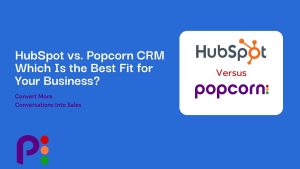Hey there, fellow small business owners! Today, I want to talk to you about a crucial aspect of running a successful small business: CRM pipelines. Customer Relationship Management (CRM) is the backbone of any business, and when it comes to small businesses, having an effective CRM pipeline can make all the difference. In this blog post, we’ll dive into the world of CRM pipelines, discuss their importance, and explore how they can help you streamline your sales and customer management processes. So, let’s get started!
What is a CRM Pipeline?
At its core, a CRM pipeline is a visual representation of your customer’s journey from the initial lead to closing a deal and beyond. Think of it as a step-by-step roadmap that guides your sales and customer management efforts. It helps you keep track of your interactions, nurture leads, and move them through different stages of the sales process.

The Importance of CRM Pipelines for Small Businesses:
Now, you might be wondering, “Why do I need a CRM pipeline for my small business?” Well, here’s the deal: small businesses often have limited resources and a smaller customer base. This is where CRM pipelines shine! They allow you to focus your efforts and resources on the right leads, nurture relationships effectively, and close deals more efficiently.
1. Organising and Prioritising Leads:
A CRM pipeline enables you to categorise your leads based on their stage in the sales process. You can identify your hottest prospects, prioritise follow-ups, and allocate your time and resources accordingly. With a well-structured pipeline, you can ensure that no lead slips through the cracks and every potential customer receives the attention they deserve.
2. Streamlining Sales Processes:
By mapping out your sales process within a CRM pipeline, you can identify any bottlenecks or inefficiencies. You can determine which stages take longer than others and where leads tend to get stuck. This insight allows you to optimise your processes, eliminate roadblocks, and ensure a smooth flow from lead generation to closing the deal.
3. Enhancing Customer Relationships:
Effective CRM pipelines don’t just focus on closing deals but also on building lasting relationships with your customers. By tracking customer interactions and preferences, you can personalise your approach, anticipate their needs, and provide exceptional customer service. This level of personalisation helps build trust and loyalty, increasing the likelihood of repeat business and referrals.
Building Your CRM Pipeline:
Now that you understand the significance of CRM pipelines, let’s discuss how to build one for your small business. Here are the key steps to get started:
1. Identify Your Sales Process:
Examine your existing sales process and break it down into distinct stages. Common stages include lead generation, qualification, proposal, negotiation, and closing. Adapt these stages to fit your business model and industry.
2. Define Your Pipeline Stages:
Once you’ve identified your sales process stages, create corresponding stages within your CRM pipeline. Each stage should represent a clear milestone or action that moves the lead closer to becoming a customer. For example, you might have stages like “Lead Captured,” “Qualified Lead,” “Proposal Sent,” “Negotiation,” and “Closed Won.
3. Customise Your Pipeline:
Tailor your pipeline to match your business needs. Many CRM software solutions allow you to add custom fields, tags, or additional stages to align with your specific requirements. This flexibility ensures that your CRM pipeline aligns perfectly with your business processes.
4. Track and Monitor Progress:
Regularly review and update your CRM pipeline as leads move through the stages. Monitor key metrics, such as conversion rates and average time spent in each stage. This data will help you identify areas for improvement and make data-driven decisions to enhance your sales and customer management processes.
Click here to get more tips on creating an effective sales pipeline
Choosing the Right CRM Software:
To implement an effective CRM pipeline, you’ll need suitable CRM software. Here are a few factors to consider when choosing the right CRM software for your small business:
Click here to Watch a video on choosing the Right CRM for you Small business
1. Scalability:
Ensure that the CRM software you choose can grow with your business. Look for a solution that offers scalability and can accommodate your evolving needs as your customer base expands. But what ever you do, don’t start with a system that will be right for your business in 2 years time, get one that is right for the next 12 months and then when you have out grown it, you can easily migrate the data – this way you won’t be fighting with complex and expensive CRM solutions.
2. User-Friendliness:
Opt for a CRM system that is intuitive and easy to use. Your team members should be able to quickly adapt to the software without extensive training, allowing them to focus on what matters most: building relationships and closing deals.
3. Integration Capabilities:
Consider CRM software that seamlessly integrates with other tools you use, such as email marketing platforms or project management software. Integration eliminates manual data entry and ensures a smooth flow of information across different systems.
Conclusion:
In the world of small business, effective customer relationship management is key to success. By implementing a well-designed CRM pipeline, you can streamline your sales processes, nurture customer relationships, and achieve higher conversion rates. Remember, a CRM pipeline is not a one-time setup but a living entity that requires regular maintenance and fine-tuning. Embrace the power of CRM pipelines, choose the right CRM software, and watch your small business thrive in the world of customer-centricity. Happy pipelining!
And that’s a wrap, folks! I hope this blog post has provided you with valuable insights into CRM pipelines for small businesses. Remember to customise your CRM pipeline to fit your unique business needs and choose the right CRM software that empowers your sales and customer management efforts. If you have any questions or thoughts, feel free to drop them in the comments section below. Until next time, happy CRM-ing!











